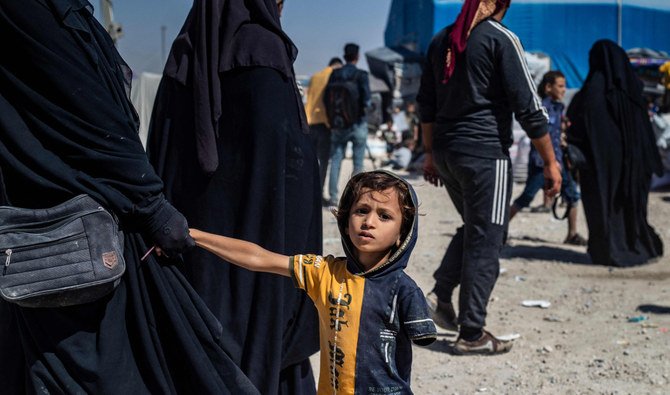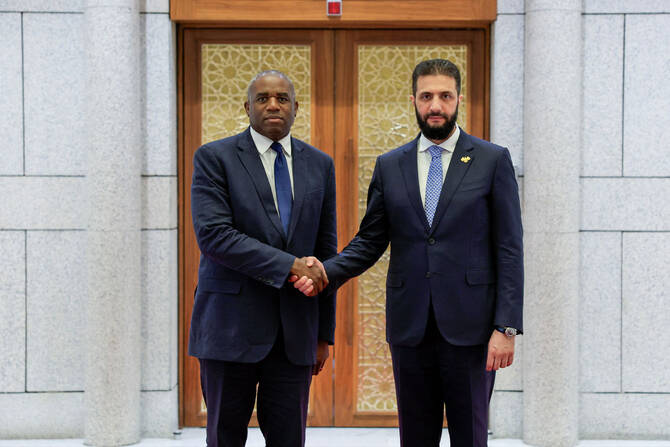BEIRUT: Airstrikes from unidentified drones killed three pro-Iran fighters in Syria’s eastern province of Deir Ezzor near the Iraqi border, a Britain-based war monitor said on Wednesday.
The drones late on Tuesday targeted trucks of the Iraqi paramilitary network Hashd Al-Shaabi after they had crossed the border into the Syrian border district of Albu Kamal, the Syrian Observatory for Human Rights said.
Three were killed and several severely wounded, the monitoring group said.
A source within the Hashd in Iraq however said that “the strikes destroyed four vehicles, but no one was killed.”
“The site targeted was near a border post of the factions on the Iraqi-Syrian border,” the source said.
The Fatah alliance, the political wing of the Hashd, condemned an “abject attack” on its forces on the frontier.
It called on Iraq’s government and parliament to “determine the countries responsible” and confront them.
Iran-backed groups, including the Hashd, are present near the Iraqi border in Syria’s far east.
The strikes on Albu Kamal come after a drone attack late on Saturday against the Irbil international airport, which includes an airbase of the US-led coalition that has been fighting Daesh.
There were no casualties in the attack on the base in Iraqi Kurdistan.
Attacks of this kind, normally targeting US troops or US interests in Iraq, have become common in recent months.
Although no one claims responsibility for them, Washington blames pro-Iranian forces in Iraq.
The US has twice conducted deadly strikes against the Hashd in eastern Syria since President Joe Biden took office, in February and June this year.
Israel has carried out hundreds of airstrikes on Syrian territory, targeting regime positions as well as allied pro-Iran forces since the start of the decade-old Syrian war.
Meanwhile, the sole survivor of the jihadist cell that killed 130 people in Paris six years ago on
Wednesday claimed France “knew the risks” of attacking jihadist targets in Syria, as he spoke out again one week into the trial into France’s worst postwar atrocity.
“We attacked France, targeted its population, civilians, but there was nothing personal,” said Salah Abdeslam.
“(President) Francois Hollande knew the risks he was taking in attacking the Islamic State (Daesh) in Syria,” he said, referring to the decision of the French president at the time to authorize strikes against the jihadist extremist group in Syria.
His calm statements contrasted sharply with outbursts he made during the first few days of the trial that opened last week, where 19 others are also accused in the biggest trial in modern French legal history.
This was the first time in the trial Abdeslam addressed the court with the judges’ permission.
Many in the audience, including families of the dead and the roughly 350 people physically injured, cried or hugged one another as Abdeslam spoke, the day of his 32nd birthday.
He insisted that he and his co-accused were not “terrorists, jihadists, extremists” but “Muslims” —
“It’s about authentic Islam,” he said.
“They say often that I’m being provocative, but it’s not true, I want to be sincere,” Abdeslam said.
“My goal is not to hurt anyone.”
Abdeslam was one of 10 jihadists deployed to sow terror in Paris on the night of Nov. 13, 2015, using suicide bombings and mass shootings.
The group struck first at the Stade de France stadium north of Paris, where three men blew themselves up.
Shortly afterward, another team attacked bars and restaurants in the heart of the capital while three others stormed the Bataclan concert hall.
Nine attackers blew themselves up or were shot dead by police.
Abdeslam, who dumped his defective explosives vest in a public bin, was captured four months later after a shootout with police in the Brussels suburb of Molenbeek, where he grew up.
The marathon trial will last until May 2022, with 145 days of scheduled hearings involving about 330 lawyers and 300 victims.
AFP






















